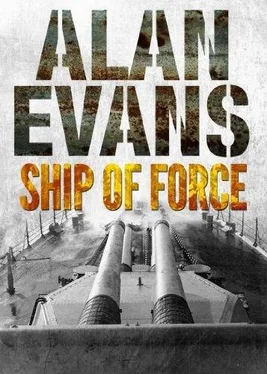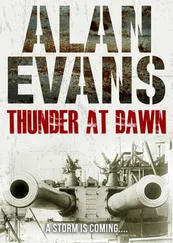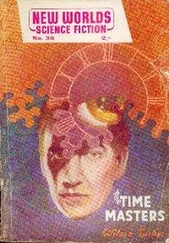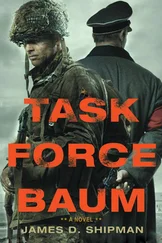The Sub-Lieutenant was grateful for it. Another thirty-knotter came up at them out of the darkness, anchor party at work on her turtle-back fo’c’sle. Sparrow swept around her stern and Smith murmured, “That’s Gipsy . She’s escort to the other monitors.”
The monitors and the drifters were assembling now at Hill’s Pocket, the anchorage to the north-east of Dunkerque, and Sparrow was threading through them. He said, “ Marshall Marmont fine on the port bow. You can just see that tall turret of hers.”
Sanders could. That was distinctive enough. As Sparrow steamed past the monitor he saw that she, like Gipsy , was anchoring in the Pocket to wait for the dawn. But Sparrow steamed on. The port look-out called, “Ship on the port bow!”
Smith’s head whipped around and he reached for the glasses that hung from their strap on his chest. He had borrowed them from Lorimer, the seventeen-year-old midshipman who was at the chart-table under its hood abaft the first funnel, keeping the ship’s track. Smith started to lift the glasses, but paused. The ship was near enough and clear enough for him to see that she was no enemy destroyer but a drifter. “Ask her number.”
The signal lamp clattered and seconds later light stuttered erratically from the drifter. The signalman read, “Seven…three…five.” He looked at his list. “That’s Grimsby Lass , sir.”
Smith told Sanders, “Come about and run alongside her. I want to talk to her skipper.” For Sparrow had been sent to look for two men and had precious little information on where to look. ‘Off the Nieuport Bank’ covered a large area of dark sea.
Sanders ordered, “Port ten.” He sounded a little more confident now, not relaxing but not strung tight any more. Smith noted the tiny signs and grunted approvingly to himself.
“Port ten…Ten of port wheel on, sir.” replied Gow.
Sparrow ’s head swung through a half-circle until Sanders said, “Ease to five…steady.”
“Steady on two-oh-five, sir.” intoned Gow.
Sparrow had turned into the drifter’s wake, was now running down to overhaul her and Sanders waited, eyes on the narrowing gap, then ordered, “Slow ahead both.” The bosun’s mate worked the handles of the engine-room telegraphs and Sparrow’s speed fell away. The way on her took her alongside the drifter but there she stayed, keeping station.
Sanders ordered, “Hold her there, cox’n.”
“Aye, aye, sir.”
Sanders had timed it almost perfectly. Was it skill or luck? There had certainly been a little experienced anticipation on the part of Gow at the helm and Smith suspected Sanders was a shade relieved.
Smith grinned. “That was well done.”
The drifter was one of scores sent to sea to lay nets or sweep mines, patrol the barrages or escort the fishing fleets. A fishing vessel herself, she was built of wood, around two hundred tons gross with a wheelhouse aft and a three-pounder that was no more than a pop-gun, right in the eyes of her before the foremast. Grimsby Lass was barely creeping, she looked to be wallowing along, lower in the sea than she should be and water jetted continuously in streams from her deck; she was pumping.
Smith used the bridge megaphone to hail her across the narrow strip of sea that boiled between her and Sparrow . “ Grimsby Lass !”
He saw a figure drop down from the wheelhouse to the drifter’s deck, caught the sheen of oilskins as the skipper lifted his hands to bawl between them, “Aye!”
“I’m off to search for that Harry Tate you reported down in the sea. What can you tell me?” Smith lowered the megaphone.
The drifter’s skipper bawled. “We was out on the coast barrage but making for Dunkerque. She was in a fight north of us wi’ three o’ they German fighters. When they turned back for home she turned an’ all and headed for Dunkerque but she was near down and her engine on fire when she passed over us. It was getting dark but near as we could see she came down to seaward of the Nieuport Bank. Judy’s gone to look for her.”
He paused and Smith said, “You’re pumping. Are you holed?”
“Not holed. We were sweeping up some Jerry mines. Suppose some U-boat laid ’em. Anyhow, one went off a bit close and sprung the old girl’s timbers. We’re making water but we’ll get home all right so long as we take it steady and keep pumping.” He paused again, then added, “Wished I could ha’ gone wi’ Geordie Byers. He’s skipper o’ the Judy an’ a good seaman but he’s new to the Channel and a hare-brained bugger. You’ll need to watch him. I says to him, ‘You’ll have your work cut out, Geordie, wi’ the dark an all.’ ‘I can burn a flare,’ he says! I told him not to be so bloody silly but I don’t know if it did any good.”
‘Bloody silly’ was a mild phrase. It would be madness to burn a flare when the Nieuport Bank was only three or four miles from the enemy-held Belgian coast and the guns there, and barely ten miles from Ostende where the Germans had destroyers and from whence came U-boats. Smith raised the megaphone. “I’ll look out for him. Thank you.”
The oilskinned figure lifted an arm in acknowledgment.
Smith ordered, “Port ten.” And “I’ll take her now, Sub.”
Sanders said, “Lorimer reports course is six-seven degrees, sir, on this leg.”
Smith had laid off that course himself before Sparrow got to sea. He told Gow, “Course six-seven degrees.”
And to Sanders, “I want a good man in the chains.” As they would be running through shoal waters.
“Aye, aye, sir.” answered Sanders. He turned on the bosun’s mate. “Get McGraw. Send him for’ard.”
It was a long time since Smith had served in the Channel. He would have to remember a lot of things and very quickly. “Revolutions for ten knots.” There were two men in the sea and it was Sparrow ’s and Smith’s job to try to save them, but it would do no good to run Sparrow aground or into collision and Geordie Byers’ drifter Judy was somewhere in the darkness ahead.
They turned to starboard when short of the minefields that closed the gap at the southern end of the mine-net barrage, reduced to five knots and stole over the Smal Bank with McGraw in the chains and swinging the lead, chanting the soundings. Sparrow turned to port, increased to ten knots and headed up the West Deep. To starboard a searchlight stabbed at the night, swept briefly, went out. That was the monitor on guard at La Panne and a landmark for Smith. Nieuport was another, of sorts. There was a glow in the night off the starboard bow that faded then brightened, a pulsing glow from the guns’ firing and the flares that went on through the night and every night. Men were dying there.
As the men in the RE8 might well be. If they were not already dead. Smith knew something of the effect of a flimsy aeroplane smashing into the solidity of the sea. It would break up. The engine would sink like a stone and drag some of the aircraft down with it. And maybe the men. There would be floating wreckage because the Harry Tate was mostly fabric and wood but spotting that wreckage on a night like this would not be easy. He knew what it must be like for the men in the sea and the darkness, the cold darkness. He shivered and one of the crew of the twelvepounder looked at him curiously. This wasn’t cold. Not really Channel-cold.
They reached the Nieuport Bank. Smith ordered, “Revolutions for five knots.”
Sanders spoke into the engine-room voice pipe and Sparrow ’s speed fell from ten knots to a creeping five. Except for Gow at the wheel and intent on the compass, every man on the bridge and on deck was searching the dark sea for wreckage — or a man. Smith knew how easy it was to run down a man in the sea and so had reduced speed, but even so they would be on him almost as soon as they saw him.
Читать дальше












